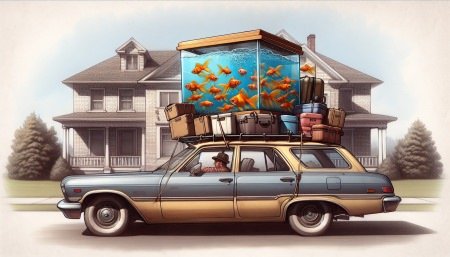| Back to Back Issues Page |
 |
|
The Goldfish Gazette, Issue #132 Goldfish Holiday Season Care December 30, 2024 |
Goldfish Care TipsA Free Monthly Resource For Goldfish Enthusiasts In This Issue Just as you are about to leave for your holiday, disaster strikes. An emergency arises with your Goldfish that needs immediate attention. With some planning, these emergencies can be avoided, or if one does happen, you can be prepared so your holiday isn’t affected. Goldfish Holiday Season Care
Over the many decades I have kept Goldfish, I have developed techniques for safely leaving my Goldfish unattended for 2-3 weeks at a time. Listed below are the areas I focus on before embarking on holiday. FeedingFeeding is largely driven by water temperature. If you are taking holidays during winter, and depending on where in the world you are living, your Goldfish should be in a low state of activity, especially if they are in an outdoor pond.At the extreme end of winter water temperatures, say below 10oC (50oF), your Goldfish aren’t interested in food at all, so they can be safely left for many weeks without being fed. At temperatures between 10-15oC (50-59oF), your fish will easily cope with no feeding for two or three weeks. For temperatures between 15oC (59oF) and 20oC (68oF), how long your fish can cope with no feeding depends on their general health, size, and fat reserves. Goldfish in excellent condition will easily cope with not being fed for two weeks. Summer holidays are more of a problem as it is the growing season for Goldfish. I wouldn't worry about feeding if you are away for a week. At a stretch, larger fish, say 70mm (2 ¾") body length and larger and in good condition, can easily cope with two weeks without food. A relative or neighbor may need to be coerced into feeding your fish any longer than that. I haven’t mentioned automatic feeders because I haven’t found one that is reliable enough, and I feed gel food, which they aren’t built to handle. SicknessPrepare a sick bay with a filter some weeks before departure. The filter won’t be cycled, but any fish needing the sick bay won’t be fed while you are away, so ammonia from waste should be minimal.Only add salt to the water at 0.3% solution (3-4 grams per liter, a tablespoon per gallon) and nothing else except for a Praziquantel-based medication such as API General Cure or PraziPro if flukes or a protozoan parasite such as Costia is suspected. Most other medications such as Methylene Blue destroy the filter beneficial bacteria. If the whole pond or aquarium shows signs of a major disease outbreak, do a complete water change and treat the entire pond or aquarium with salt and Praziquantel. Remove all living plants, crustaceans, and algae eaters if you use salt. Equipment FailureThe biggest concern is filter failure. If your aquarium or pond is heavily populated, I would consider running an aerator while you are away. The filter will go putrid, but because its contents are contained within the filter, it should do no harm.An aerator will keep the dissolved oxygen at a safe level. A filter should not be running in a pond if water temperatures are low enough to cause ice to form. A low-wattage pond heater should be installed for the same reason. Power failures are common, so non-return valves should be fitted to aerators, and filters should be self-priming (able to restart water flow without human involvement). Housekeeping the Week Prior to DepartureClean out filters a day or two before going on holiday. Even though nothing may be going into the water to create ammonia from waste, a clean filter can handle an unexpected death better than a clogged one.Large water changes should be made for the same reason, but not pond water if the water temperatures are low and the fish are dormant or semi-dormant. Do regular pond or aquarium maintenance, such as trimming plants of any dead or dying leaves and siphoning off detritus from the bottom. Turn heaters down to 18oC (64oF). Put lights on a timer. The Helpful Neighbor DangerUse neighbors sparingly. One of the greatest dangers to Goldfish is the well-meaning neighbor or relative who is easily seduced by Goldfish begging for food.Write down instructions and give a demonstration on how to feed the fish. Package food in appropriately sized amounts for each feeding. Reduce the feeding frequency to lessen the burden on your neighbor. List possible emergencies such as the filter stopping or leaking, dead fish, water temperature drop, or water quality issues and what to do about each. Equipment such as nets, tongs, hoses, and spare containers should all be accessible. And make sure they have a contact phone number. SummaryFor short periods of up to two weeks, it is safer to leave your fish un-fed.If you have someone feed your fish, provide written instructions and demonstrate what is required. Make water changes and clean out filters just prior to your holiday. P.S. Have a very prosperous and Happy New Year. Comments? Ideas? Feedback? I'd love to hear from you. Just reply to this e-zine and tell me what you think, or what topics you want to be covered. www.facebook.com/aboutgoldfish |
| Back to Back Issues Page |
